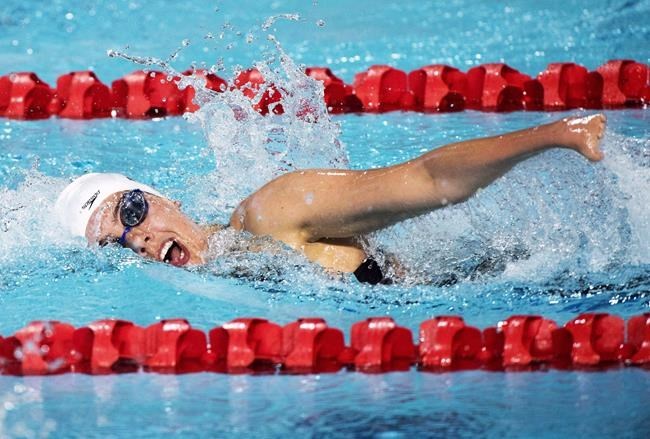Aurelie Rivard has learned to adapt to swimming with no fans in the stands to cheer her on.
The Paralympic star can dig deep within herself to find that pre-competitive adrenalin rush.
Organizers announced Monday that fans will be barred from the Tokyo Paralympics because of the global COVID-19 pandemic, just as they were from the recently completed Olympics.
Rivard isn't fazed by the fact no fans will be on hand when she plunges into the shimmering water at the aquatic venue near Tokyo Bay. She's thrilled that after 18 long months with no meets -- period -- she'll finally have swimmers in the lanes next to her.
"At first, it was bothering me, the thought of not having the adrenalin from the crowd," Rivard said. "But at the same time, all year long, I had to try to step up without any sort of adrenalin from any exterior factors.
"So, we're kind of used to it by now, and to be honest, just for me, having rivals next to me is a bonus and a good thing, because I haven't had any for almost two years."
The 25-year-old from Saint-Jean-sur-Richelieu, Que., carried Canada's flag into the closing ceremonies after her triple gold medal performance at the Rio Paralympics five years ago. She also won a silver there, and silver as a 16-year-old at the 2012 London Paralympics.
Tokyo could be Rivard's final Paralympics. She'll take a much-needed break after to determine her immediate future.
Since Rivard hasn't competed since the pandemic began, she doesn't know quite what to expect in Tokyo.
But watching the Olympics, which closed on Aug. 8, has filled her with hope. For the longest time, Rivard wondered if the Paralympics would even happen.
"For once I was really happy that the Paralympic Games were after the Olympic Games," Rivard said from a swim team camp in Vancouver before she flies to Tokyo on Tuesday. "Nobody knew what to expect. Especially for us, people were saying 'Well, if there's one Games that is going to be cancelled, it will be the Paralympics. If something happens in the Olympic Games, they're going to cancel the Paralympics, there's not as much money put into it for TV, for example.'
"So, we were holding on by a thread all year."
Canadian athletes overcame months of COVID-19 obstacles to capture an impressive 24 medals at the Tokyo Olympics. Canada's swim team won six of them.
"To see that the Canadian swimmers really stepped up and delivered amazing performances despite the uncertainty is honestly just a small reassurance that we didn't have all year, but we got it (from watching the Olympics)," Rivard said. "Better late than never. It was definitely a boost of confidence -- like OK, well, they did it so we can do it too."
COVID-19 protocols and travel restrictions were tough on Canadian athletes. For a long time, Rivard had no access to training facilities. Her parents' backyard pool, she said, was too cold for the first few months of the pandemic. She had no weight-lifting equipment at home.
"(The past 19 months) felt like five years to be honest," said Rivard, who was born with an underdeveloped left hand.
In a pre-Olympic season that stretched close to two years, when the pool in Quebec finally did open, ever-changing pandemic protocols prevented her from racing another swimmer. Her only races were against the clock.
"It was obviously hard because we didn't know what was coming. We didn't know if we would have a Games or not. We ended up having absolutely zero opportunities for racing" she said. "I had nothing else to do than train. So it's just been very interesting, especially when an Olympic year is already so stressful, so to add all that on top of it is not something I would want to do again."
The Olympic swim trials in Toronto cancelled the Paralympic events to keep numbers down amid strict protocols, so Rivard was appointed to the Para team based on past performances.
She hasn't set any medal goals for Tokyo, it's too tough to gauge how her rivals have done in the pandemic. But the time goals she's set should see her climb the podium and perhaps break some world records.
She's made some changes to her swimming, and it's not lost on her that her first chance to test them out in competition is the Paralympics.
"The biggest meet ever," she said. "I don't have a buffer or anything."
Canada's strong Tokyo Olympic performances made for perfect timing for her confidence. Rivard's family has six TVs in their Quebec home, and she said every one was set to a different sport during the Olympics.
Her favourite performances were the gold medals won by Maggie Mac Neil (100-metre butterfly), Damian Warner (decathlon), Andre De Grasse (200 metres) and the women's soccer team.
Rivard, who spoke to reporters after recently signing a partnership with Wayne Gretzky Estates and their Pursue Greatness campaign, is uncertain about her post-Tokyo career. At the moment, Rivard, who recently completed her first year of law school, is not committing to the 2024 Paris Paralympics.
"I just want to take time and get out of the swimming world completely, see my friends that I've been neglecting and see my family and travel if I can, and just try to see something different than the pool deck."
Rivard will swim in five individual races and one relay at the Paralympics, which run Aug. 24 to Sept. 5.
This report by The Canadian Press was first published Aug. 16, 2021.
Lori Ewing, The Canadian Press




